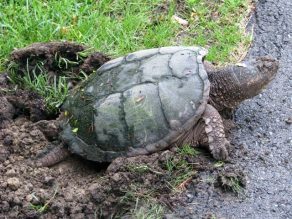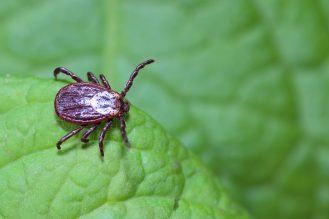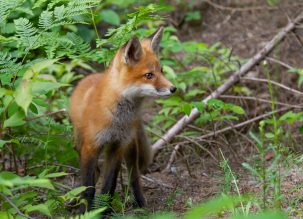Climate Survival for Wildlife Big and Small
Environment | July 27, 2022
Climate change is not only a human problem. Mississauga’s hotter summers and milder winters also affect wildlife. Many animals, including mammals, birds, amphibians, reptiles, insects, fish and others experience the effects of climate change, just like we do.
As our climate changes, we’re experiencing warmer temperatures and gradually changing weather patterns, disrupting the balance of nature with major consequences on wildlife globally, as well as here in Mississauga.
Some impacts that adversely affect wildlife include:
- Increased disease
- Increased invasive species
- Diminished food sources
- Habitat loss
- Strained reproduction cycles
Local animal extinctions are already widespread because of climate change. By 2100, global temperatures are projected to be above two degrees Celsius, increasing the risk of extinctions and ecosystem collapse. Over the past five years, Mississauga, like many other cities, has experienced more intense rain and windstorms, which have damaged trees, wildlife habitats and aquatic ecosystems.
Over the past 80 years, according to the Credit Valley Conservation, weather patterns in Peel Region show the climate is becoming warmer and wetter, with the greatest changes occurring during the last three decades. There has been an average annual temperature increase of 1.8 degrees, double the rate of warming measured globally.
Regionally, wildlife is experiencing:
Changing habitats
Warmer weather reduces oxygen levels in water streams like the Credit River. This can have an impact on aquatic wildlife like fish, including trout and salmon, as well as native plants, reptiles and amphibians. The Eastern hemlock, a native tree in the Credit River Watershed, is also in decline because of changing weather patterns. This tree species provides important habitat to birds who nest in the dense foliage and shades streams to cool down water temperatures. The loss of native trees can further affect streams that are already warming due to changing temperatures.
More invasive species
When natural and urban ecosystems are affected by climate change, invasive species can move in and create further damage. For example, extreme outbreaks of the invasive species Lymantria dispar dispar (LDD) – formerly known as gypsy moth – typically end when a natural control including a virus and fungus kill the population. Warmer and drier springs can prevent this targeted fungus from flourishing, thereby prolonging LDD outbreaks resulting in impacts on trees throughout the city.
The Emerald Ash Borer is another invasive insect that attacks Ash trees. Extreme cold winter days kill the larvae and mitigate their impact. Fewer extreme cold days result in increased range and insect populations – essentially killing Ash trees in Mississauga, which are an important component of the City’s urban forest.
Trees play a critical role in fighting climate change as they improve air quality, reduce stormwater runoff, lower urban temperatures and clean water. These invasive pests leave the trees more vulnerable to other diseases, drought and ultimately the loss of habitat for wildlife.
Increased disease
Warmer temperatures are increasing the range and population size of mosquitoes, ticks and other pests that carry disease. This includes blacklegged ticks that carry Lyme Disease. Wild mammals, like white-tailed deer, raccoons and small rodents like squirrels, chipmunks and mice can all carry ticks and can contract Lyme Disease. Warm temperatures influence the life cycle and prevalence of blacklegged ticks. Shorter winters can increase their activity significantly.
The West Nile Virus’ expansion in Canada has also been linked to climate change and has been found in more than 150 bird species. Owls, hawks, eagles and songbirds such as blue jays are extremely susceptible to West Nile Virus.
Wildlife in Mississauga depend on healthy habitats which include the right temperatures, access to water, food sources and comfortable areas to raise their young. Climate change is developing quickly and altering wildlife’s survival while putting natural resources at risk.
How you can help:
- Reduce your own carbon footprint to do your part to fight climate change.
- Preserve and respect wildlife habitats. When visiting a park or trail, leave wildlife alone (e.g., avoid feeding, stay on the trails, pick up waste/litter).
- Plant a pollinator-friendly garden with native types of grass, wildflowers, shrubs and trees.
- Report sightings of invasive species.
- Report animals in distress.
The City is working to protect wildlife and natural ecosystems through:
- The Climate Change Action Plan, which includes actions to both mitigate and adapt to climate change.
- The Invasive Specific Management Plan and Implementation Strategy, which enhances native biodiversity and overall ecological integrity of the city’s natural areas.
- The Natural Heritage and Urban Forest Strategy, which provides a framework for how to protect, enhance, restore and expand the city’s natural heritage and urban forest.
- The Urban Forest Management Plan, which addresses environmental pressures that trees face.
- The One Million Trees Program seeks to plant more trees in Mississauga, expanding wildlife habitats within the city.
- Support for wildlife rescue and public education through Animal Services.
Climate change is real, not only for humans, but for also for precious wildlife. Every action we take to reduce its impacts can benefit our ecosystems and habitats, creating a more sustainable environment for all creatures and species.
Learn more about wildlife, forestry and the environment in Mississauga.
Tags
Media contact
City of Mississauga Media Relations
media@mississauga.ca
905-615-3200, ext. 5232
TTY: 905-896-5151




